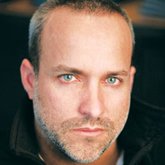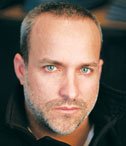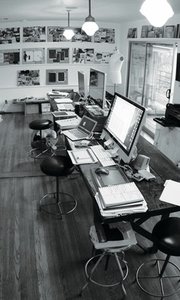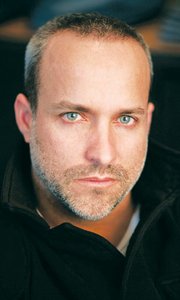Jason Bleick Starts Brand Identity and Design Studio
Jason Bleick thought he was going to take a break after he closed the chapter on the brand Ever almost one year ago. (See related story.) He was the father of a newborn, wanted to spend time with the family and planned to “go down a different path.”
As a surfer and motorcycle hobbyist, Bleick took on a project designing a new premium collection with the Australian custom motorcycle and surf clothing brand Deus ex Machina, which opened its first U.S. retail shop in Los Angeles’ Venice neighborhood this year. The new premium collection will be made in Los Angeles, using fabrics knitted in local mills, and is targeted toward the premium contemporary market. And just like that, Bleick Studio was up and running out of the starting gate.
“All of a sudden, I just kind of fell back into work. The Deus project was one thing I was starting right after [I left Ever]. Then I said, ‘Okay, I’ll do one more thing for someone else.’ Then another thing after that, and now I have a small staff of designers and graphic artists and a full-service design studio,” Bleick said.
Most of his clients are in the apparel business, such as surf and skate brand Analog, Citizen of Humanity, Hang Ten and Kohl’s stores. His reach continues to grow in other industries, such as working with the San Diego–based boutique wetsuit company Matuse and rebranding a record label.
“One of the coolest things about our studio is our location. We are in an old mid-century modern house in the Hollywood Hills below the Hollywood sign, overlooking the city of Los Angeles,” Bleick said. “I believe the culture and the environment are one of the most important parts of the studio dynamic for producing the best and most creative work for our clients.”
Though most of his work is in the creative department, he handles a limited amount of production. In addition to producing the line for Deus ex Machina, Bleick will be designing and producing some special items under the Bleick Studio label in collaboration with top boutique retailers. California Apparel News Contributing Writer Rhea Cortado checked in with Bleick to get a deeper look at his design studio and work.
What are the services your design studio does for clients?
We do apparel design and everything mainly targeted toward the premium market and some stuff for the action-sports market. They come to us for an outsider’s opinion, a different point of view to work with their design teams. Sometimes we’re doing our own categories; sometimes we’re collaborating on categories with them. We do a ton of graphic art, too—a lot of T-shirt designs and things for people as well.
How deep and involved in the design and manufacturing process do you go for your clients?
We’re doing full apparel collection and design—all the way to producing samples and some production for people. We produce photo shoots for some of them, lookbooks, and pretty much design and deliver everything up to the point of sales and then hand it off to the salespeople—all the creative stuff. We also do a lot of brand identity. For some brands, it’s coming up with new divisions, what that logo and brand looks like, and that whole purpose and vision for the brand. Some people that have been around for a while—it’s coming up with a whole new vision for them and a whole new updated look. They come to us to evolve and update. I’m having a good time doing it.
What is your competitive edge?
They [clients] like the brand and the product combined—the connections, too. I have a lot of sources for fabric, trims, and for factories, [both] domestically and imports. When we do design, we build the tech packs and, for some brands, communicate with the factory in China all the way through the development process. Sourcing is something [in which] we’re kind of a one-stop shop. We can be the creative people, and we’re really good at tech packing, costing and communication—whereas a lot of design studios are mainly creative. I’m working with a ton of print studios—antique prints to modern computerized prints—so I’m able to offer different things that are refreshing and unique.
You also launched a new line with Hang Ten called Hang Ten Gold. How did that start, and what are the details about the line?
We design the upper-end collection, called Hang Ten Gold—which sells at Fred Segal, American Rag and Bloomingdale’s—and design consult for Hang Ten at Kohl’s department store.
[We launched Hang Ten Gold] at the last Project show and made it out of beautiful fabrics, all California-made or Italian and Japanese fabric, with inspiration from what Hang Ten was but re-creating it in a modern luxury, casual luxury way: cashmere ponchos and 100 percent cashmere leggings for women [and for] guys, chambray chinos, nylon windbreakers and graphic tees on amazing 50-single Supima cotton, processed and really cool stuff. That’ll be launching July 15.
Does the affordable Hang Ten line still sell at Kohl’s stores?
They still do. Now it seems acceptable where you see Nike doing shoes from $19 all the way up to $2,000 dunks. You see Levi’s doing the same thing up to the high-end, super handcrafted. Some people are selling to Target or JC Penney and dealing high end as well. I think it’s okay to do that as far as the buyers have been. Nobody has been worried about it. There is clear separation between the two [Hang Ten lines], and they both have their purpose. It has been good.
What are you are doing for the Deus ex Machina line that showcases your design specialties?
I’ll be in the washhouse and laundry facility hands-on processing everything and coming in with very unique ink treatments on the T-shirts. We mix a lot of cracked ink and work with the screen printer. We’re always trying to develop these new processes and techniques—not only design. That’s only one step in the designing—the cut and sew—but then [there is also] what you do at the laundry facility to process and age it and achieve the right hand feel.
I ride motorcycles and surf and do everything that those guys are all about, so I wanted to make garments that are riding-friendly but doesn’t look like you just stepped off your motorcycle. It could be a normal jacket but then the way the pockets have zippers because you don’t want things to fly out when you’re riding. The hood on it adjusts a little bit differently because you don’t want the wind flapping. Reinforcements are in the crotch area because that’s one area when you are getting on and off your bike. It rips and wears eventually, but it doesn’t stand out.
Ever had its own stores, and many brands now, such as Deus ex Machina, are both wholesale manufacturers and retailers. What do you think about this business model?
I think [having a retail store is] an amazing way to showcase your brand. It’s like running a permanent ad. You can bring in all your props and vision, [even down to the] smell of the store. I really believe in that for brands. The wholesale part of the business is the hardest part. Getting paid from retailers was tough. There’s some great retailers that have wonderful brands, but they don’t have the square-footage space to showcase them right. They can really order three or four styles out of the whole collection, and therefore the consumer only sees 5 percent or 10 percent of what [the brand does] on the rack. But I guess that’s just how that goes.


























